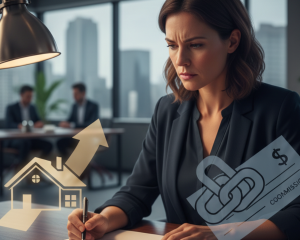Who Can Witness a QLD Mortgage?
Embarking on the journey of homeownership can be both exciting and overwhelming. One aspect of this process often queried by Queensland homebuyers is, “Who can witness a QLD mortgage?” In this article, we delve deeper into the specifics of this important aspect, including the key steps, legal obligations and potential repercussions of not complying with these requirements.
Overview of QLD Mortgage
In the world of finance and real estate, a Queensland (QLD) Mortgage is a legal instrument that ensures security for a home loan. This document delineates the legal obligations of the borrower and lender and includes essential details such as the loan amount, interest rates, and the names of the parties involved. Essentially, it is an agreement that confers conditional ownership of a property from its owner (the mortgagor) to a lender (the mortgagee) as security for the loan.
Who is Eligible to Witness a QLD Mortgage?
The question of who can witness a QLD mortgage is of paramount importance. Under the QLD Land Title Act 1994, the eligible witnesses can be a Justice of the Peace, a Commissioner for Declarations, a lawyer, a notary public, or an Australian consular officer. It’s crucial that the appointed person is a trustworthy, reliable individual who understands the gravity of the situation. It’s also important to note that not anyone can witness a mortgage; this person must meet the government’s specific requirements.
What is the Role of the Witness?
A witness in the execution of a mortgage serves a vital purpose. They provide an additional layer of security and validation to the mortgage process. The role involves verifying the identity of the person signing the document, ensuring the signatures match the provided identification, and confirming that the signatory fully comprehends the obligations and responsibilities they’re agreeing to. The witness then affixes their own signature on the document as evidence of the signatory’s comprehension and agreement.
What Documents are Needed to Witness a QLD Mortgage?
The documents needed to witness a QLD mortgage primarily include the original mortgage document, and the identification document(s) of the signatory. The original mortgage document contains crucial information such as the name of the borrower, lender, and the specifics of the loan agreement. It’s the primary piece of evidence signifying the commitment between the two parties.
In terms of identification, typically, a current photo ID like a driver’s license or passport is required. It serves to validate the identity of the signatory, ensuring that the person who signs the document is indeed who they claim to be. It’s essential that the witness cross-checks the ID presented with the name specified in the mortgage document.
Additionally, certain forms like the QLD Land Title Practice Manual’s Form 20 – Certificate of Witness or Qualified Witness form must be completed by the witness. This form serves as a declaration by the witness that they have verified the signatory’s identity and that they have taken the necessary steps to ensure the signatory understands the mortgage document.
What is the Process for Witnessing a QLD Mortgage?
Witnessing a QLD mortgage involves several key steps. First, the witness must be present at the signing of the document. They then confirm the signatory’s identity by checking their ID. After ensuring that the signatory understands the terms and is signing voluntarily, the witness then signs the document themselves, creating an official record of the verification process.
What are the Legal Requirements for Witnessing a QLD Mortgage?
Beyond the presence of a qualified witness, there are additional legal requirements for witnessing a mortgage in QLD. These include the verification of the signatory’s identity, a check to ensure the signatory understands the contents of the document, and confirmation that the document is being signed voluntarily. Neglecting these requirements could result in legal ramifications.
What are the Penalties for Not Complying with QLD Mortgage Requirements?
Failure to adhere to the proper witnessing procedure and the associated legal requirements can have severe consequences. This can include potential criminal charges, significant fines, or the mortgage being declared null and void. These are serious consequences that highlight the importance of following the proper procedures.
What are the Benefits of Having a Witness for a QLD Mortgage?
Having a witness when signing a QLD mortgage carries with it several benefits. The primary advantage is that it lends an added layer of legality and validity to the mortgage signing process. The witness acts as an objective third party who can verify that the signing process was conducted in accordance with legislation, thereby reducing the chances of potential legal complications.
A witnessed mortgage also provides a level of protection to both the signatory and the lender. By verifying the identity of the signatory and confirming they understand the commitment they are undertaking, the witness helps to ensure the integrity of the agreement.
In addition, having a witness can provide peace of mind. Buying a home is a significant decision, and having someone there to ensure the process is done correctly can alleviate some of the stress. It’s a critical service that both the borrower and lender can appreciate.
What are the Risks of Not Having a Witness for a QLD Mortgage?
Conversely, not having a witness for a QLD mortgage carries significant risks. First and foremost, an unwitnessed mortgage could be declared null and void, which means the agreement could be deemed non-existent. This situation could lead to a loss of entitlement to the property for the borrower and a loss of security for the lender.
Moreover, if a dispute arises, an unwitnessed mortgage would likely lack the legal fortitude necessary for resolution. Without a witness, there is a lack of proof that the signatory fully comprehended the obligations they were accepting.
In some cases, an unwitnessed mortgage can also give rise to fraudulent activities. For example, someone may falsely claim to be the borrower and sign the mortgage document. In the absence of a witness, the detection of such fraudulent actions could become significantly more difficult.
In all, while the process of having a QLD mortgage witnessed requires some additional effort and possible costs, it is a necessary part of the process. The potential risks associated with an unwitnessed mortgage far outweigh the minor inconvenience and additional expense of appointing a qualified witness. It’s a crucial part of securing your dream home, which shouldn’t be overlooked.
Ensure Your Homebuying Journey is Legally Sound
Understanding the intricacies of a QLD mortgage is crucial in the homebuying process, and ensuring its validity is paramount. Don’t let minor oversights lead to major complications down the line.
📞 Consult with a Qualified Expert
Join the ranks of informed Queensland homeowners. From witnessing requirements to understanding the significance of each step, let our experts guide you through every detail.
Connect with a QLD Mortgage Specialist Today
Frequently Asked Questions About QLD Mortgages
What are the requirements to be a witness for a QLD mortgage?
To be a witness for a QLD mortgage, the individual needs to be qualified (Justice of the Peace, Commissioner for Declarations, lawyer, notary public, Australian consular officer), and capable of verifying the signatory’s identity and confirming the signatory understands the document.
Who can witness a QLD mortgage?
Justice of the Peace, Commissioner for Declarations, lawyers, notary publics, and Australian consular officers are eligible to witness a QLD mortgage.
What is the role of a witness for a QLD mortgage?
The witness verifies the identity of the person signing the mortgage document, confirms that they understand its contents, and affirms that they signed it voluntarily. The witness then signs the document to certify these facts.
What are the consequences of not having a witness for a QLD mortgage?
Not having a witness for a QLD mortgage can lead to legal issues, including potential fraud and the mortgage being declared null and void. Severe penalties, such as criminal charges and fines, could also be a result.
What are the benefits of having a witness for a QLD mortgage?
A witness adds legal safety and validity to the mortgage process. They ensure the signatory is who they claim to be and understand the agreement they’re entering.



